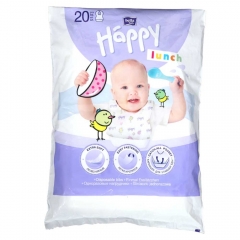-
 Thanh toán đa dạng, linh hoạtChuyển khoản ngân hàng, thanh toán tại nhà...
Thanh toán đa dạng, linh hoạtChuyển khoản ngân hàng, thanh toán tại nhà... -
 Miễn Phí vận chuyển 53 tỉnh thànhMiễn phí vận chuyển đối với đơn hàng trên 1 triệu
Miễn Phí vận chuyển 53 tỉnh thànhMiễn phí vận chuyển đối với đơn hàng trên 1 triệu -
 Yên Tâm mua sắmHoàn tiền trong vòng 7 ngày...
Yên Tâm mua sắmHoàn tiền trong vòng 7 ngày...
The Newborn Sleep Book: A Simple, Proven Method for Training Your New Baby to Sleep Through the Night
-

- Mã sản phẩm: 0399167986
- (245 nhận xét)

- Publisher:TarcherPerigee; 1st edition (August 5, 2014)
- Language:English
- Paperback:224 pages
- ISBN-10:0399167986
- ISBN-13:978-0399167980
- Item Weight:7.6 ounces
- Dimensions:8.66 x 5.91 x 0.98 inches
- Best Sellers Rank:#573,648 in Books (See Top 100 in Books) #356 in Sleep Disorders #702 in Parenting Girls #1,220 in Baby & Toddler Parenting
- Customer Reviews:4.2 out of 5 stars 245Reviews

Mô tả sản phẩm
Review
"The Jassey brothers, partners in a Long Island pediatric paractice, have helped thousands of parents successfully sleep-train their newborns by the time they are a month old. The "Jassey Way" is practical, realistic, and based on the undeniable link between eating--specifically digesting--and sleeping."
--Publishers Weekly
"A common sense method for getting your baby to remain sleeping long after you’ve tucked him or her in."
--Shaul Turner, FOX News
"Their method has been tested for over twenty years and boasts a 90 percent success rate. After just two weeks on the doctor’s program, baby Peyton was sleeping 7 to 8 hours per night, and so were his relieved parents. Thanks to the Jassey method, many new parents and their babies are enjoying more peaceful nights of sweet, uninterrupted dreams."
--Vicki Clinebell, Momtastic Parenting
Product Description
Developed and refined by two successful pediatricians, the "Jassey Way" boasts more than a 90% success rate of getting children to sleep through the night in their first 4 weeks of life. A safe and proven technique, the Jassey Way uses a feeding schedule that allows newborns (and their parents) a full night's sleep at a younger age than other sleep training techniques.
About the Author
Dr. Lewis Jassey opened his own pediatric practice in 2001 and has appeared on NBC’s Today show.
Dr. Jonathan Jassey has been a highly regarded pediatrician in the same practice for over eight years, and has received both the “Patients’ Choice Award” and the coveted “Most Compassionate Doctor” recognition.
Excerpt. © Reprinted by permission. All rights reserved.
PREFACE
Let There Be Sleep!
Why Sleep Train?
As pediatricians with more than thirty years of combined experience, we’ve helped countless parents sleep train their newborns, with great success—regardless of whether they were first-time parents, skeptical about the process or eagerly on board from the start. To address the desires and concerns of parents who approach sleep training from different angles, we’ve written a few letters to them (feel free to read them all or just the one that best applies to you and your family).
Letter to the First-Time Mom
Hi First-Time Mom!
Congratulations on the new addition to your family and welcome to the most exciting, amusing, difficult, mystifying and downright rewarding adventure you could ever hope to have on this earth.
One of the first questions we ask new moms and dads we see in our practice is: “Do you want your baby to sleep through the night?”
Since you’re reading this book, your answer is probably “Yes,” or at least “Maybe . . . as long as it’s safe” or something similar. Or perhaps it’s “Yes! Good Lord, yes!” Those are the most common reactions we get.
But some parents look at us like it’s a trick question. Like they’re thinking:
“This is a test. Infants aren’t supposed to sleep through the night, they need to be fed constantly, like a parking meter, and if we act like we don’t know that, Dr. Jassey is going to report us to child services.”
Well, it’s not a trick question. It’s not a test. It’s more a politely rhetorical question, a transition question from which we can flow into our signature spiel, where we explain our sleep training method, “the Jassey Way.”
The reason that this question is not totally rhetorical is that some parents actually answer “No!”
We rarely see them, but some parents do think that having a baby that doesn’t sleep through the night, and being miserably tired all the time as a result, is sometimes just an inevitable part of parenting. And that that’s all there is to it.
But the truth is, we want all parents to answer our question with a “Yes. Yes, I want my baby to sleep through the night.” And there’s a simple reason for that.
Our job is to look after the well-being of the child, and in that capacity, we’re responsible for giving parents all of the tools they need to promote and protect that child’s well-being. And one of the most important tools parents can have is being well rested themselves. Being well rested helps parents to be not only more alert, but happier. It makes them better parents.
That’s the one-line argument for sleep training, new mom:
A happier, more alert parent is a better parent.
So we’d prefer that your newborn not keep you up all night. Because the only way you can consistently get the good night’s sleep you need to be the best parent you can be is for your baby to get a good night’s sleep, too.
So please—let there be sleep!
Sincerely,
Lewis and Jonathan Jassey
Letter to the Experienced Mom
Hi Experienced Mom,
If your previous child (or children) did not sleep through the night, and left you tired and possibly unhappy much of the time as a result, then we probably don’t have to convince you of the merits of sleep training. The concept sells itself!
But if your previous child was one of the rare, miracle babies that slept through the night almost automatically, then there’s probably not much we could say to convince you that this next child will be any different. You’re probably going to want to ride that hot streak. We’re realists. We know how it is. We’ve seen it all before.
But we do beseech you to keep this book handy, because we assure you: Siblings rarely take after each other in their ability to sleep through the night without training. And there may soon come a time when you rise up and finally exclaim: “Let there be sleep!”
Be warned!
Sincerely,
Lewis and Jonathan Jassey
Letter to the Mom Who Thinks Sleep Training May Be Harmful
Dear Mom Who Would Consider Sleep Training, But Thinks It May Be Harmful to Her Baby,
We understand your concern, because there’s a lot of misinformation out there. Some so-called experts theorize that babies aren’t “meant” to sleep overnight, period; that they need to be fed on a twenty-four-hour cycle. Others will tell you that babies can only be sleep trained at a certain age, and that it’s asking too much of them physically and mentally before then.
These claims are just not true. They might be completely well intentioned, but they’re also unfounded.
As we’ll address in more detail in the following pages, there is no established evidence that infants need to feed overnight to maintain healthy weight gain or development, or that being trained to sleep overnight puts at risk a baby’s long-term health.
In reality, the arguments against baby sleep training are emotional, not rational.
Have you ever had a friend who’s afraid of flying? You show them all the irrefutable statistics proving that air travel is the safest mode of transportation available, but while they’re happy to get in a car, going up in the sky in a jet remains out of the question. Even they admit their fear is not rational; it’s purely emotional.
We can look at baby sleep training in much the same way. All objective evidence points to it being safe.
So please, do yourself—and your child—a favor. Let there be sleep!
Sincerely,
Lewis and Jonathan Jassey
Why Choose This Book?
You can’t eat sushi. You can’t smoke. You can’t smoke marijuana. You can’t smoke crack. You can’t jump on trampolines. It’s basically a giant list of things you can’t do.
—Father-to-be Seth Rogen, describing a baby book to mother-to-be Katherine Heigl, in Knocked Up
A Brief History of Baby Care
Did you know that human beings have been having babies for about two hundred thousand years? It’s true; for as long as people, in our present biological form, have existed, we’ve been having babies. And since we, as a species, began speaking languages only around a hundred thousand years ago, that means that we were having babies for around a hundred thousand years before any caveman or -woman could even have dreamed of composing a baby book.
But you wouldn’t know it from reading these books today. Too many baby care books, baby sleep books included, tend to treat infants as if they’re delicate Fabergé eggs balancing on slanted rooftops; if Mommy or Daddy even look in the wrong direction, baby will come tumbling down and shatter to pieces. The way these books tell it, the fact that the human race has reproduced, let alone prospered as long as it has is nothing short of a miracle.
Okay, we exaggerate. But we agree with Seth Rogen’s character in the 2007 movie Knocked Up—because someone has to lighten the mood here in the Land of Baby Care Literature. That’s also why we had the Eagles classic “Take It Easy” in our heads while writing much of this book. Because the happy truth is that your baby is a supremely resilient little creature. You think your MacBook Air can take a good licking? You think a Bugaboo stroller is an indomitable fortress? These things are impressive, but could they have survived during, say, the Stone Age?
Babies did.
Babies.
• • •
Needless to say, not all babies survived such periods, and tragically, even in this day and age, there are babies all over the world suffering from want.
But if you bought this book, or if someone gave it to you, the odds are overwhelming that you possess the fundamental physical and emotional resources required to raise a perfectly healthy baby—with the help of a relatively small amount of important advice.
Most experienced parents (moms and dads who have had a child before) know this already, of course. They’ve learned it from the best possible baby guide there is: a living, breathing, growing baby. They tend to be much more confident with the second baby. But it’s not just that they’ve acquired a whole set of parenting skills from the first child. It’s also the case that they’ve learned they don’t have to be so afraid of screwing up, as Jessica S., whose daughters are our patients, put it:
You’re much more cautious with everything [the first time]. You’re sterilizing the pacifier every time it hits the floor. Now you’re rinsing it off. You realize babies aren’t as delicate as you’d think.
But too many parents don’t seem to understand this. They fear that if they’re not keeping up with the latest books and theories on parenting, and applying them to their children immediately, they’re negligent somehow. They’re not.
So we want to make that point up front, because if we’re about to give you more than a hundred pages of parenting “advice,” we want to make sure that you understand that, should you not follow our advice, it would not imply that you are a “bad” parent. Because chances are, as long as you are a thoughtful parent with positive intentions, your child is going to be just fine.
And we don’t only say that to ease your mind. We say it because more than anything else—well, besides your child being healthy—we want you to enjoy this time. We’re not sure that we’re eloquent enough to properly capture in words the magic of parenthood, but let’s just say that it’s not something you want to miss out on, if you can at all help it.
But scared parenting is like scared driving; it doesn’t accomplish its own aim, and it removes any joy you get from the activity in the process. We want you to have confidence! As we said, if you’re reading this book, chances are you totally have what it takes to raise a great kid.
Navigating the Rough Waters of Baby Sleep Advice
If you go on any Internet message board or blog, you’ll see endorsements for any number of sleep training methods, many of them completely at odds with one another. And yet moms swear by them just the same.
We are confident that the Jassey Way is the best baby sleep training method. We are confident it offers moms and dads the best chance to get their children sleeping through the night. Our ballpark estimate is that, since we started coaching parents in the Jassey Way in our practice over fifteen years ago, nine out of ten parents who have followed through on it have been successful.
But you’ve no doubt heard of the success of other methods, and you’ve seen Internet message boards that endorsed various strategies, and you surely have friends who have sworn by other baby sleep books. So it might be helpful to explain why, when you get right down to it, all baby sleep books and methods are pretty similar and are all fairly successful.
The reason for this assertion is pretty simple: All baby sleep books have two extra guarantees built into them.
The first: All babies sleep, and some babies naturally sleep through the night on their own.
Certainly, only some babies come equipped with this skill on their own, not most or even many; but we do see it.
So your baby might sleep through the night no matter which book you read—or even if you don’t read any book at all. In fact, you could be completely illiterate, and your baby might sleep like a rock from day one.
All this is to say that every baby sleep book has a fighting chance of succeeding, no matter what procedures it advocates.
The second baby sleep book guarantee: The core of any baby sleep training method is routine.
Babies are creatures of habit. And they depend on environmental cues to know what to do and when. So getting your baby to sleep through the night is largely a matter of conditioning her to do so. It’s a matter of building a framework of routine around your baby’s daily life that enables a long nighttime stretch during which she is accustomed to sleeping.
Whether it’s putting your baby to bed at a particular time every night, always reading or singing to your baby to help her to sleep, making sure lighting and other environmental factors remain constant, sticking to a consistent feeding schedule, or whatever else, you’d be hard-pressed to find a baby sleep training method that didn’t have some kind of routine at the heart of it.
When we combine these two certainties—that some babies will sleep through the night on their own, and that getting any baby used to a daily routine increases the chances that that baby will sleep through the night—we can see why any baby sleep book or method has at least a decent chance of success.
And since this is such a personal issue for moms and dads, it’s easy to understand how, if one method works for a particular family, they might come to trumpet that method and critique others—even if they have no personal experience with them.
Now that we’ve explained how we’re not special, let’s talk about how we are.
WE KEEP IT REAL
We don’t mean to brag, but: We never intended to write a book about baby sleep. We are in this to help babies and parents. When it comes to baby sleep, we 100 percent keep it real.
Our sleep training method, the Jassey Way, was something we would simply explain to the parents we saw in our pediatric practice. We’d ask, “Do you want your baby to sleep through the night?” and if the answer was “Yes,” we would explain our method. We were happy when the parents reported back to us that it was successful, but our baby sleep ambitions never extended beyond the walls of our office in Bellmore, Long Island.
But over the years, more and more parents we saw in our practice started telling us, “You have to write a book about it,” in reference to our sleep method. Eventually, enough of them said it that we decided to do it.
So you see, the Jassey Way wasn’t developed from studies, or lab tests, and it hasn’t been “proven” by them, either. It comes from the sum total of treating more than fifteen thousand babies over the course of more than thirty years combined of practicing pediatrics.
The bottom line: The Jassey Way has worked for the families we treat. It’s worked for enough of them that we can say, with confidence, that it should work for most babies; it’s more a matter of whether or not you want to use our method, than of whether or not it will work.
THE PROCESS IS STRAIGHTFORWARD
Some baby sleep books read more like incredibly detailed manuals for do-it-yourself furniture or electronics assembly.
We’re talking about the books that advocate Olympic figure skating–like routines surrounding the nightly act of putting the child to bed: meticulous, time-consuming multistep procedures involving highly calibrated lighting, scripted spoken lines, check-ins at various intervals, keeping sleeping logs—those sorts of things. We’re talking about sleep training methods that might succeed by making you a MD/PhD in baby sleep, when all you need is a little undergrad-level summer course.
In contrast, the Jassey Way is very structured, sure, but it is not at all complicated, complex, or particularly demanding of your time.
WE’RE ALL ABOUT COULD, NOT SHOULD
- Mua astaxanthin uống có tốt không? Mua ở đâu? 29/10/2018
- Saffron (nhụy hoa nghệ tây) uống như thế nào cho hợp lý? 29/09/2018
- Saffron (nghệ tây) làm đẹp như thế nào? 28/09/2018
- Giải đáp những thắc mắc về viên uống sinh lý Fuji Sumo 14/09/2018
- Công dụng tuyệt vời từ tinh chất tỏi với sức khỏe 12/09/2018
- Mua collagen 82X chính hãng ở đâu? 26/07/2018
- NueGlow mua ở đâu giá chính hãng bao nhiêu? 04/07/2018
- Fucoidan Chính hãng Nhật Bản giá bao nhiêu? 18/05/2018
- Top 5 loại thuốc trị sẹo tốt nhất, hiệu quả với cả sẹo lâu năm 20/03/2018
- Footer chi tiết bài viết 09/03/2018
- Mã vạch không thể phân biệt hàng chính hãng hay hàng giả 10/05/2023
- Thuốc trắng da Ivory Caps chính hãng giá bao nhiêu? Mua ở đâu? 08/12/2022
- Nên thoa kem trắng da body vào lúc nào để đạt hiệu quả cao? 07/12/2022
- Tiêm trắng da toàn thân giá bao nhiêu? Có an toàn không? 06/12/2022
- Top 3 kem dưỡng trắng da được ưa chuộng nhất hiện nay 05/12/2022
- Uống vitamin C có trắng da không? Nên uống như thế nào? 03/12/2022
- [email protected]
- Hotline: 0909977247
- Hotline: 0908897041
- 8h - 17h Từ Thứ 2 - Thứ 7
Đăng ký nhận thông tin qua email để nhận được hàng triệu ưu đãi từ Muathuoctot.com
Tạp chí sức khỏe làm đẹp, Kem chống nắng nào tốt nhất hiện nay Thuoc giam can an toan hiện nay, thuoc collagen, thuoc Dong trung ha thao , thuoc giam can LIC, thuoc shark cartilage thuoc collagen youtheory dau ca omega 3 tot nhat, dong trung ha thao aloha cua my, kem tri seo hieu qua, C ollagen shiseido enriched, và collagen shiseido dạng viên , Collagen de happy ngăn chặn quá trình lão hóa, mua hang tren thuoc virility pills vp-rx tri roi loan cuong duong, vitamin e 400, dieu tri bang thuoc fucoidan, kem chống nhăn vùng mắt, dịch vụ giao hang nhanh nội thành, crest 3d white, fine pure collagen, nên mua collagen shiseido ở đâu, làm sáng mắt, dịch vụ cho thue kho lẻ tại tphcm, thực phẩm tăng cường sinh lý nam, thuoc prenatal bổ sung dinh dưỡng, kem đánh răng crest 3d white, hỗ trợ điều trị tim mạch, thuốc trắng da hiệu quả giúp phục hồi da. thuốc mọc tóc biotin























 KHUYẾN MÃI LỚN
KHUYẾN MÃI LỚN Hỗ Trợ Xương Khớp
Hỗ Trợ Xương Khớp Bổ Não & Tăng cường Trí Nhớ
Bổ Não & Tăng cường Trí Nhớ Bổ Sung Collagen & Làm Đẹp
Bổ Sung Collagen & Làm Đẹp Bổ Thận, Mát Gan & Giải Độc
Bổ Thận, Mát Gan & Giải Độc Chăm Sóc Sức khỏe Nam Giới
Chăm Sóc Sức khỏe Nam Giới Chăm Sóc Sức khỏe Nữ Giới
Chăm Sóc Sức khỏe Nữ Giới Chăm sóc Sức khỏe Trẻ Em
Chăm sóc Sức khỏe Trẻ Em Thực Phẩm Giảm Cân, Ăn Kiêng
Thực Phẩm Giảm Cân, Ăn Kiêng Bổ Sung Vitamin & Khoáng Chất
Bổ Sung Vitamin & Khoáng Chất Bổ Tim Mạch, Huyết Áp & Mỡ Máu
Bổ Tim Mạch, Huyết Áp & Mỡ Máu Bổ Mắt & Tăng cường Thị lực
Bổ Mắt & Tăng cường Thị lực Điều Trị Tai Mũi Họng
Điều Trị Tai Mũi Họng Sức Khỏe Hệ Tiêu hóa
Sức Khỏe Hệ Tiêu hóa Chăm Sóc Răng Miệng
Chăm Sóc Răng Miệng Chống Oxy Hóa & Tảo Biển.
Chống Oxy Hóa & Tảo Biển.